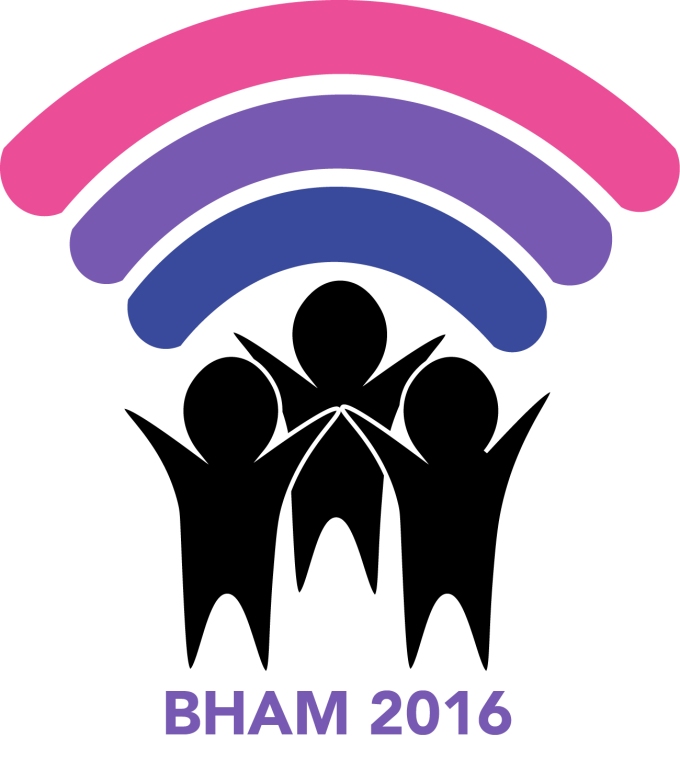
Logo by Kate Estrop
BISEXUAL RESOURCE CENTER DESIGNATES MARCH AS BISEXUAL HEALTH AWARENESS MONTH
The third year of this social media campaign dedicated to raising awareness about the health disparities of bisexual+ youth
Contact: Julia Canfield, MPH, CHES bham@biresource.org
Boston, MA – With a focus on the unique needs and experiences of bisexual+ youth, the Bisexual Resource Center (BRC) proudly proclaims March as Bisexual Health Awareness Month (BHAM) for the third year in a row.
Bisexual+ youth, who encompass a diverse spectrum of sexual identities (e.g. bisexual, fluid, no label, pansexual, queer), experience higher rates of suicidality, substance use, bullying, and sexual violence compared to their gay, lesbian, and straight peers. They are also less likely to be connected with programs and services, both at school and in their local community, that can best support them.
Therefore, Bisexual Health Awareness Month aims to raise awareness about these health disparities and to promote resources and actions that can improve the health of bisexual+ youth. BHAM will work in partnership with various LGBTQIA organizations, including the Human Rights Campaign, The Trevor Project, BiNet USA, and Bisexual Women of Color (BIWOC), to achieve this mission. This year’s campaign will also empower bi+ youth to share their health-related experiences and needs.
“With more and more youth coming out as bi+, the need to highlight their disparities becomes more crucial every day,” said BRC Co-Presidents Heather Benjamin and Kate Estrop in a joint statement. “This year, Bisexual Health Awareness Month is providing a needed spotlight on bi+ youth to educate parents, teachers, administrators, health professionals, and other members of the LGBTQIA community on how they can help. It’s important that bi+ youth know that they are not alone, they are valued, and they have community.”
Throughout the month of March, BHAM will focus its efforts on bisexual+ youth with the following weekly themes:
- March 1-4: (Statistics) A focus on current statistics and research surrounding bisexual+ youth, including mental health, sexual health, and interpersonal violence.
- March 7-11: (Intersectionality) An emphasis on how race, ethnicity, gender, ability, and class can further impact social, economic, and health disparities among bisexual+ youth, particularly in regards to experiences of oppression and discrimination.
- March 14-18: (Resources) A spotlight on current resources, and the creation of new ones, that can improve the health and wellbeing of bisexual+ youth.
- March 21-25: (Action) The promotion of programs, policies, and services that can work to prevent or decrease social, economic, and health disparities among bisexual+ youth.
The third year of Bisexual Health Awareness Month launches Tuesday, March 1st on the BRC’s Twitter (with hashtags #BiHealthMonth and #BHAM), Facebook, Tumblr, newly launched blog, and campaign website. The BRC invites individuals and organizations both in the United States and from around the world to become involved with this year’s campaign and to raise awareness about health disparities impacting bisexual+ youth in their own communities.
The Bisexual Resource Center (BRC) has been advocating for bisexual visibility and raising awareness about the needs of bisexual people throughout the LGBTQIA and straight communities since 1985. The BRC envisions a world where love is celebrated, regardless of sexual orientation or gender expression.
Visit www.biresource.org for more information.